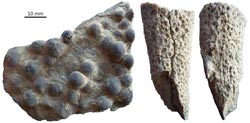
Reefs Recover Faster Post-Mass Extinction Than Expected

Harsh living conditions caused by major fluctuations in the carbon content and sea levels, overacidification and oxygen deficiency in the seas triggered the largest mass extinction of all time at the end of the Permian era 252 million years ago. Life on Earth was also anything but easy after the obliteration of over 90 percent of all species: Throughout the entire Early Triassic era, metazoan-dominated reefs were replaced by microbial deposits.
Researchers had always assumed it took the Earth as long as five million years to recover from this species collapse. Now, however, an international team, including the paleontologist Hugo Bucher from the University of Zurich and his team of researchers, has proven that reefs already existed again in the southwest of what is now the USA 1.5 million years after the mass extinction. These were dominated by metazoan organisms such as sponges, serpulids and other living creatures, the researchers report in Nature Geoscience.
Growth thanks to new reef-forming metazoan organisms
Metazoan-dominated reefs already developed during the Early Triassic, much earlier than was previously assumed. As soon as the environmental conditions more or less returned to normal, the reef began to grow again due to metazoan organisms that had played a secondary role in reefs up to then. “This shows that, after the extinction of dominant reef creators, metazoan were able to form reef ecosystems much sooner than was previously thought,” says Hugo Bucher, summing up the new discovery.
Literature:
Arnaud Brayard, Emmanuelle Vennin, Nicolas Olivier, Kevin G. Bylund, Jim Jenks, Daniel A. Stephen, Hugo Bucher, Richard Hofmann, Nicolas Goudemand and Gilles Escarguel: Transient metazoan reefs in the aftermath of the end-Permian mass extinction, in: Nature Geoscience, 18 September 2011, DOI: 10.1038/NGEO1264
Contact:
Prof. Hugo Bucher
Institute of Paleontology and Museum
University of Zurich
Phone: +41 44 634 23 44
E-mail: hugo.fr.bucher@pim.uzh.ch












